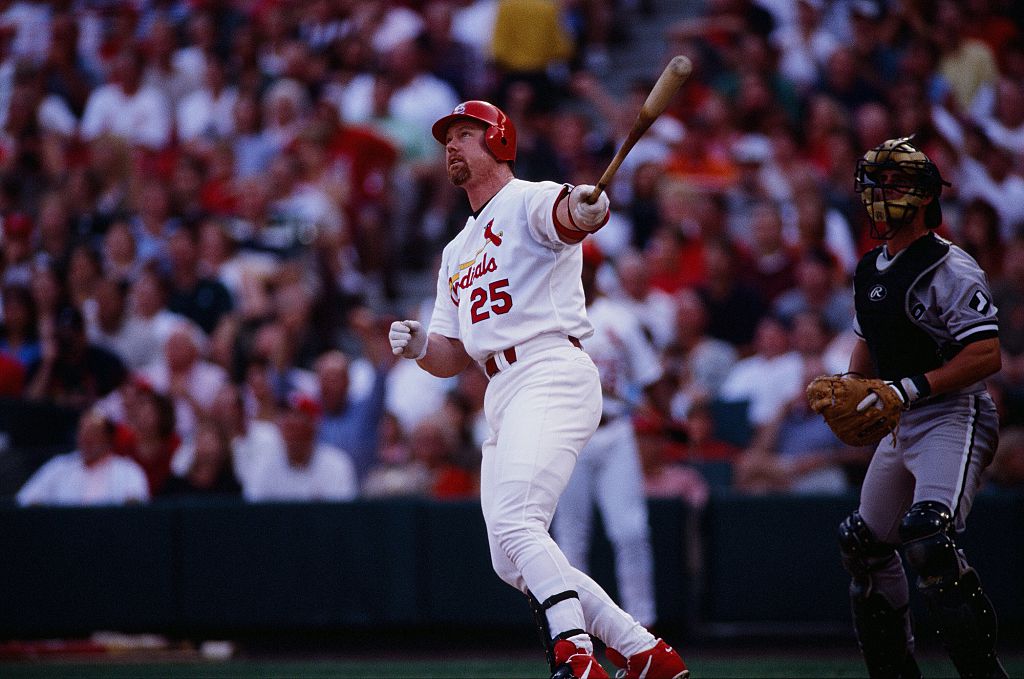MLB
Mark McGwire Made $128,000 For Every Home Run

Mark McGwire may not have been the most complete baseball player. In fact, his skill set was extremely limited. He recorded 150 hits just twice in his 16-year MLB career. And he sure struck out a ton. But the reason the Oakland Athletics and St. Louis Cardinals paid him almost $75 million wasn’t for his base-running or fielding ability. For McGwire, his career was built around one supreme skill: hitting home runs.
Though he will never be enshrined in Cooperstown because of his ties to steroids, there’s no doubt that Big Mac could hit the long ball. And every time he launched a moonshot into orbit, he made $128,000.
Mark McGwire was an instant star for the Athletics
Mark McGwire originally got drafted in the eighth round of the 1981 MLB draft by the Montreal Expos. However, he opted to attend the University of Southern California, where he parlayed a prodigious power-hitting career into a first-round selection by the Athletics in the 1984 draft.
After an 18-game cup of coffee in 1986, the skinner version of Big Mac broke into the everyday lineup and had one of the most impressive rookie seasons in MLB history. The 23-year-old launched a league-leading 49 home runs while also pacing the majors with a .618 slugging percentage. McGwire took home Rookie of the Year honors and earned his first of six straight All-Star appearances with the Athletics.
Along with prolific power hitter Jose Canseco, Oakland boasted the most dangerous middle-of-the-order pairing in decades. The two titans powered the Athletics to three consecutive World Series appearances from 1988-1990, including a title-winning season in 1989. McGwire launched 363 homers in 1,329 games with the A’s, including a league-high 52 in his penultimate year out west.
Slugger broke the season-single home run record with the Cardinals
The Athletics began building around a young corp of Jason Giambi, Miguel Tejada and Eric Chavez in the mid-’90s. In the middle of the 1997 season, they shipped Mark McGwire to St. Louis for the forgettable package of Eric Ludwick, T.J. Mathews and Blake Stein. Their loss proved to be the Cardinals’ gain. A 33-year-old McGwire managed to hit 24 HR in just 51 games. Of course, that simply set the stage for one of the most exciting seasons in baseball history.
In 1998, McGwire and Sammy Sosa went on a rampage. They gained national attention for their ridiculous (and artificially enhanced) power-hitting pace. The two MLB stars chased Roger Maris’ single-season HR record, with McGwire ultimately coming out on top. Despite being 34 years old—an age where most hitters dramatically decline—McGwire smashed Maris’ record by totaling 70 HR.
He followed up with a 65-HR campaign the following year while posting 147 RBI for the second straight season. Even though McGwire became a part-time player, he still managed to hit 61 more long balls in his final two seasons before retiring after the Cardinals lost the 2001 NL Division Series to the eventual World Series champion Arizona Diamondbacks.
McGwire made almost $75 million for his power-hitting prowess
To say Mark McGwire profited off hitting home runs would be a massive understatement. The right-handed slugger didn’t start out making top-of-the-line money, either. In fact, he didn’t break the $1 million salary mark until his fifth season in Oakland. However, he went on to become one of the MLB’s top earners well before Alex Rodriguez and Manny Ramirez reset the market in the new millennium.
McGwire earned more than $7 million per season in his final two years in Oakland before getting a major raise with the Cardinals. The record-setting first baseman made $8.9 million in 1998, including a nearly $600,000 bonus. In his final season, he earned $11 million despite playing just 97 games.
With 583 home runs and nearly $75 million in career earnings, Mark McGwire made about $128,000 every time he launched a baseball into the bleachers. Can you imagine what he’d get paid if he could replicate those power numbers into today’s era of bloated baseball salaries? McGwire made the successful transition to coaching and currently has a net worth of about $60 million.











